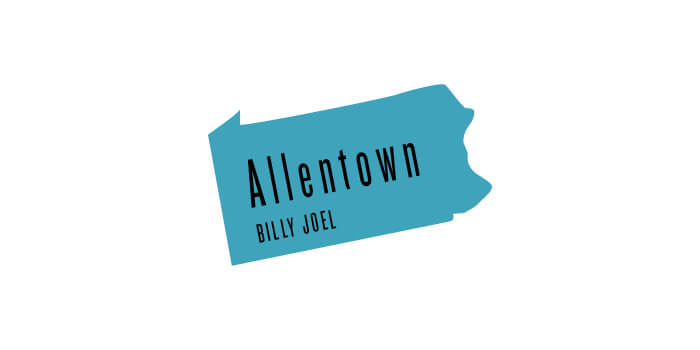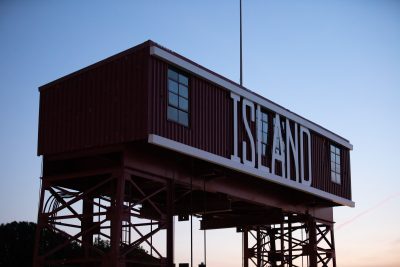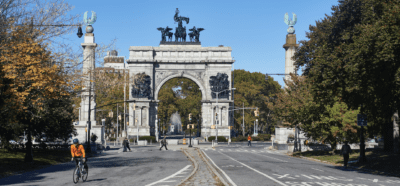Musical Map Of The USA: Pennsylvania—Billy Joel


“Oh, like the Billy Joel song!” I have heard these words a thousand times. Everyone from Allentown has. Allentown, Pennsylvania and Bethlehem–its companion city–are steel towns. They are towns responsible for the backbone of the United States. In the era when the words “steel town” evoked images of economic boom and not a bleak Bruce Springsteen song, Allentown was one of the wealthiest cities in the country. But as the industrial revolution faded, so did the glory of the towns it built. The mansions of Bethlehem Steel executives were subdivided into tiny apartments and the mills that lined the Lehigh River in Bethlehem ground to a halt. They now sit like faded monuments to prosperity. The former Bethlehem Steel building is now a nouveau Sands casino where you can see Alice in Chains of Chris Gethard.
In 1982 Bethlehem Steel lost 1.5 billion dollars and ceased most of their operations. That same year, Billy Joel released the song “Allentown.” It was (and still is) a song by a rich guy about poor people, arguably the worst kind of song. But Billy Joel knew about “Allentown.” It was a stop for him in his early touring days and he must have watched the town get progressively worse every time he returned. The song describes the plight of Bethlehem (“Bethlehem” didn’t have the same ring to it so he changed it to Allentown) in the wake a the town’s economic collapse.
Well our fathers fought the Second World War/
Spent their weekends on the Jersey Shore/
Met our mothers in the USO/
Asked them to dance/
Danced with them slow
The life promised to people after World War II existed in Allentown for a while. The suburban dream realized. But post-war life was built by men who watched their best friends die in battle and women who fought for basic human rights, all while facing the specter of untreated mental health issues and alcoholism. By 1982, the white picket fence was lined with barbed wire and a NO TRESPASSING sign.
As Allentown suffered publicly and privately, the children of displaced factory workers, cooks and school teachers started making really weird music. Heavy, aggressive, violent music. My suburban teenage brain was so confused that people my own age were already so pissed off at the world around them that they had to scream about it into microphones at basement shows. One of the first local bands I remember seeing was The Ultimate Warriors, a wrestling-themed powerviolence band. They played tight, terrifying 30-second songs that had titles like “Do You Think Sexism Is Wrong? Hey, So Do We.”
Here are some things I remember from Ultimate Warriors shows:
— Someone brought a giant slingshot and shot a live mackerel at the band.
— They hit each other and their fans with long fluorescent (real) glass light bulbs.
— Another band beat them up, took their instruments and played a set of Japanese disco pop music.
That kind of originality and spectacle–along with the guiding force of a really great local record store–were all I needed. In 1996, Double Decker Records opened in Allentown and record collectors have been making the pilgrimage there ever since. It’s one of the great hidden gems of the record store world. It’s less than two hours from New York. Go! They are celebrating their 20th anniversary on July 15th and 16th along with local record label Square of Opposition.
The pull of bigger cities got the best of my friends and I. Philadelphia, an hour down the turnpike if you’re speeding, was the first choice for many. There, the Ultimate Warriors went through a few lineup changes and emerged as Pissed Jeans, the sludgiest, dirtiest and weirdest band on Seattle’s Subpop Records. They are playing the Double Decker anniversary party.
I’m sure my friends who stayed would curse me out for saying this, but watching a city fade over the course of your young life takes it’s toll. I didn’t see anything I wanted to stay for, anything that felt like prosperity. When I was 18 I left. Now, when I go back to visit my family all I see are the good parts. The punk friend who turned screenprinting band t-shirts into a real DIY business, the weird bar where I saw Ted Leo play that still has dollar beers, the diners I haunted when I could finally drive. It’s a nice place to visit but I’d never want to live there.
Like the rich guy said:
…And it’s getting very hard to stay-y-y.
This is one of more than 50 posts that make up our musical map of the United States, published by region—the West, Midwest, South, and Northeast—by writers who have strongly associated a song with a state.
[sc name=”nattysaw4″ ]
You might also like 




















